PSYCHOLOGY 04
Harvard University
All 12 results
Sort by
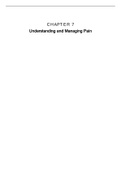
-
Understanding and Managing Pain.pdf
- Exam (elaborations) • 34 pages • 2022
- Available in package deal
-
 donatrey
donatrey
-
- $9.49
- + learn more
Understanding and Managing P CHAPT ER 7 Understanding and Managing Pain Lecture Outline I. Pain and the Nervous System All sensory stimulation, including pain, starts with activation of sensory neurons and proceeds with the relay of neural impulses toward the brain. A. Somatosensory System The somatosensory system conveys sensory information from the body through the spinal cord to the brain. 1. Afferent Neurons Afferent (sensory) neurons convey sensory information from sense organs t...
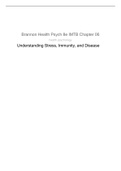
-
Understanding Stress, Immunity, and Disease.pdf
- Exam (elaborations) • 24 pages • 2022
- Available in package deal
-
 donatrey
donatrey
-
- $9.49
- + learn more
Understanding Stress, ImmUnderstanding Stress, Immunity, and Disease CHAPTER 6 Understanding Stress, Immunity, and Disease Lecture Outline I. Physiology of the Immune System The immune system consists of tissues, organs, and processes that protect the body from invasion by foreign material such as bacteria, viruses, and fungi. It also removes worn-out or damaged cells from the body. A. Organs of the Immune System The immune system includes lymph (circulating fluid that contains a type o...
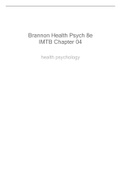
-
Adhering to Healthy Behavior
- Exam (elaborations) • 28 pages • 2022
- Available in package deal
-
 donatrey
donatrey
-
- $9.49
- + learn more
Adhering to Healthy Behavior CHAPT ER 4 Adhering to Healthy Behavior Lecture Outline I. Issues in Adherence Two requirements are necessary for medical advice to be beneficial; first, it must be accurate and second, it must be followed. Two meta-analyses indicate a large difference in outcome for people who were adherent to their medication compared to those who were not. A. What Is Adherence? Adherence is a person’s ability and willingness to follow recommended health practices. B. H...
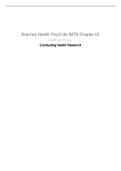
-
Conducting Health Research
- Exam (elaborations) • 26 pages • 2022
- Available in package deal
-
 donatrey
donatrey
-
- $9.49
- + learn more
Conducting Health Research CHAPT ER 2 Conducting Health Research Lecture Outline I. The Placebo in Treatment and Research A placebo is an inactive substance or condition that can cause people to improve or change their behavior. Both expectancy and learning contribute to this effect. A. Treatment and the Placebo The placebo effect is an advantage for treatment, boosting its effectiveness. This effect may be responsible for about 35% of improvements, but some treatments (such as antidep...
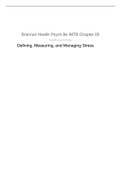
-
Defining, Measuring, and Managing Stress
- Exam (elaborations) • 33 pages • 2022
- Available in package deal
-
 donatrey
donatrey
-
- $9.49
- + learn more
Defining, Measuring, and Managing Stress CHAPTER 5 Defining, Measuring, and Managing Stress Lecture Outline I. The Nervous System and the Physiology of Stress The nervous system is made-up of neurons (nerve cells) that provide internal communication by releasing chemical neurotransmitters across the synaptic cleft (the space between neurons). The billions of connections among neurons provide for complex actions. The nervous system is divided into the central nervous system and the periph...
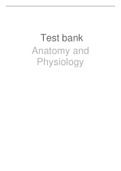
-
Essential of anatomy and physiology 6th edition
- Exam (elaborations) • 53 pages • 2022
-
 donatrey
donatrey
-
- $11.99
- + learn more
Essential of anatomy and physiology 6th edition Chapter 1 An Introduction to Anatomy and Physiology Multiple-Choice Questions 1) Characteristics of most living organisms include the ability to A) repair and completely restore itself during any type of injury. B) respond and adapt to their environment. C) control the external environment. D) form positive feedback loops. E) create a protective covering over themselves. Answer: B Learning Outcome: 1-1 Bloomʹs Taxonomy: Knowledge 2) Th...
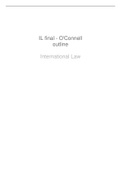
-
il-final-oconnell-outline
- Exam (elaborations) • 61 pages • 2022
-
 donatrey
donatrey
-
- $9.49
- + learn more
il-final-oconnell-outline INTERNATIONAL LAW CLASS NOTES Class 2 (2/9) -Introduction to International Law: I. Types of International Law A. Private International Law 1. deals with international situations a) ex. stealing something in another state, killing someone in another country, marrying someone with a different citizenship 2. conflict of laws 3. cases within a domestic legal system that have foreign elements 4. regulates private transactions, dealings, and disputes between legal ...
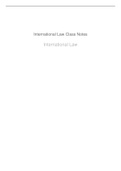
-
International Law Final Study Guide Overview I. International Criminal Law and the International Criminal Court (Dixon Ch. 6) II. Islamic Law and International Law (Powell Ch. 2) III. Similar or Different?: Islamic Dispute Resolution (Powell Ch. 3-4) IV.
- Exam (elaborations) • 75 pages • 2022
-
 donatrey
donatrey
-
- $9.49
- + learn more
International Law Final Study Guide Overview I. International Criminal Law and the International Criminal Court (Dixon Ch. 6) II. Islamic Law and International Law (Powell Ch. 2) III. Similar or Different?: Islamic Dispute Resolution (Powell Ch. 3-4) IV. Islam, Sovereignty, Territorial Disputes (Powell Ch. 5) V. Islamic Law at the ICJ (Powell Ch. 6) VI. 60 MC questions Islamic International Law: I. Islamic legal tradition A. embraces more characteristics than “Islamic law” of the ...
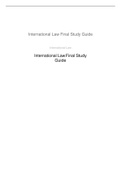
-
international-law-final-study-guide.
- Exam (elaborations) • 67 pages • 2022
-
 donatrey
donatrey
-
- $9.49
- + learn more
international-law-final-study-guide. International Law Final Study Guide Overview I. International Criminal Law and the International Criminal Court (Dixon Ch. 6) II. Islamic Law and International Law (Powell Ch. 2) III. Similar or Different?: Islamic Dispute Resolution (Powell Ch. 3-4) IV. Islam, Sovereignty, Territorial Disputes (Powell Ch. 5) V. Islamic Law at the ICJ (Powell Ch. 6) VI. 60 MC questions Islamic International Law: I. Islamic legal tradition A. embraces more characte...
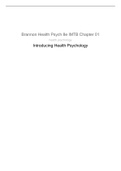
-
ntroducing Health Psychology
- Exam (elaborations) • 18 pages • 2022
- Available in package deal
-
 donatrey
donatrey
-
- $9.49
- + learn more
introducing Health Psychology CHAPT ER 1 Introducing Health Psychology Lecture Outline I. The Changing Field of Health During the 20th century, changes in the field of health were accompanied by changing patterns of disease. In 1900, most diseases were short-duration, infectious diseases, but by the end of the century, behavior and lifestyle were the underlying causes of most diseases. These changes have influenced the cost of medical care and even the definition of health, which point ...

How did he do that? By selling his study resources on Stuvia. Try it yourself! Discover all about earning on Stuvia


